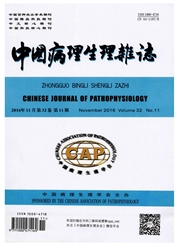

 中文摘要:
中文摘要:
目的:探讨氧化高密度脂蛋白(oxHDL)对人脐静脉内皮细胞株ECV304细胞表达组织因子(TF)的影响及其机制。方法:实验分为阴性对照组、阳性对照组(加组胺)、HDL、oxHDL4组,ECV304细胞经不同浓度oxHDL、HDL(10—120mg/L)和组胺(1×10^-9-1×10^-4mol/L)处理不同时间(2—8h)后,采用实时定量PCR(RQ—PCR)和Western bloting方法检测TF表达。同时,分别应用SP600125[C—Jun氨基端激酶(JNK)特异性抑制剂]、SB203580[038丝裂素活化蛋白激酶(p38MAPK)特异性抑制剂]、PD98059[细胞外信号调节激酶(ERKI/2)特异性抑制剂],观察其对oxHDL和组胺诱导的ECV304细胞表达TF的影响。结果:正常ECV304细胞未检测到TF,经组胺处理1h后TFmRNA表达明显增加,在l×10^-5mol/L时最高,约为1×10^-9mol/L时的4.8倍。oxHDL以时间和浓度依赖性方式诱导ECV304细胞TFmRNA表达,在oxHDL20mg/L时最高,为10mg/L时的1.8倍,在第6h时TFmRNA表达水平为第2h的5.3倍(P〈0.05),并在20mg/L时显著刺激ECV304细胞TF蛋白表达,为40mg/L时的1.5倍,而HDL没有此效应。MAPKs(JNK、p38MAPK、ERK1/2)抑制剂可部分解除oxHDL诱导ECV304细胞TF表达的效应,TF分别下调表达至原来的19.0%、5.0%和13.0%(P〈0.05)。结论:oxHDL能以浓度和时间依赖性方式诱导ECV304细胞产生TF,其机制可能通过JNK、p38MAPK和ERK1/2所介导。
 英文摘要:
英文摘要:
AIM: To investigate the expression of tissue factor (TF) induced by oxidized high density lipoprotein (oxHDL) in human umbilical vein cell line, ECV304, and the related mechanisms. METHODS: Four main groups were designed: the negative, the positive (ECV304 with histamine), the HDL group and the oxHDL group. Quantitative real - time polymerase chain reaction ( RQ - PCR) and Western blotting were used to detect the expression level of TF. The specific inhibitors of MAPKs, SP600125 (c -jun terminal NH2 kinase, JNK), SB203580 (p38 MAP kinase, p38 MAPK), PD98059 (extracellular signal -regulated kinase, ERK1/2) were used to investigate the underlying mechanisms. RESULTS: The TF expression in normal ECV304 cell line was not detected. Histamine administration resulted in a significant expression of TF in ECV304 cell line, with strongest effect after 1 h co - incubation at concentration of 1 ×10^-5 mol/L histamine ( about 4.8 - fold higher expression of TF compared with that of 1×10^-9 mol/L histamine). Expression level of TF was detected after stimulated with oxHDL in dose - and time - dependent manners. The highest expression of TF mRNA was found at 20 mg/L oxHDL and 6 h co - incubation, with 1.8 - fold and 5. 3 - fold increase in TF expres- sion, respectively, compared with that at 10 mg/L oxHDL and 2 h co - incubation. 20 mg/L oxHDL also caused an apparent augmentation of TF protein expression, about 1.5 - fold higher compared with that stimulated by 40 mg/L oxHDL. HDL co - incubation did not cause a detectable expression of TF protein. The mRNA levels of TF in ECV304 cell line induced by oxHDL were decreased by 95.0%, 81.0%, 87.0%, respectively (all P 〈0. 05) after application of inhibitors against p38MAPK, JNK and ERK1/2. CONCLUSION: The results suggest that oxHDL stimulates TF expression in ECV304 cell line in both dose - and time - dependent manners, in which MAPKs signal transduction may play an important role.
 同期刊论文项目
同期刊论文项目
 同项目期刊论文
同项目期刊论文
 期刊信息
期刊信息
